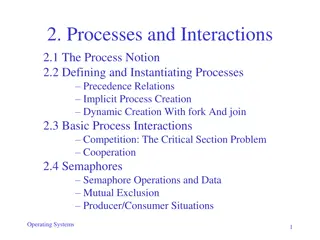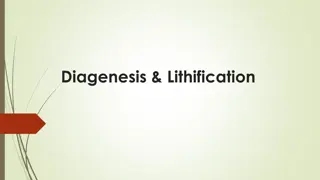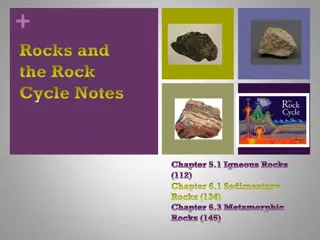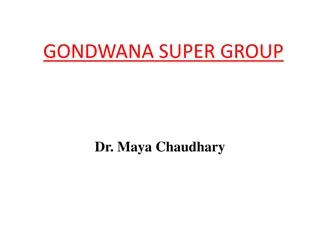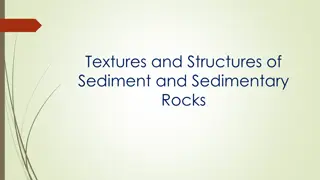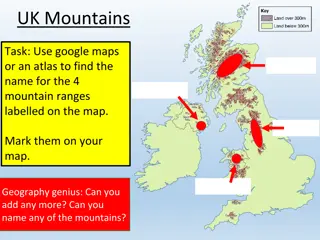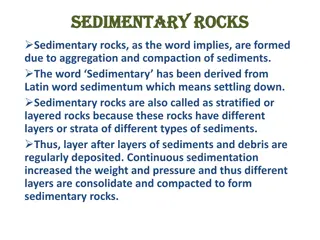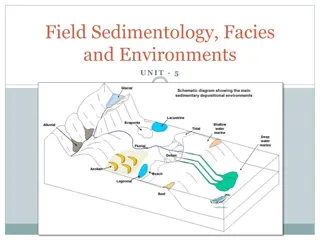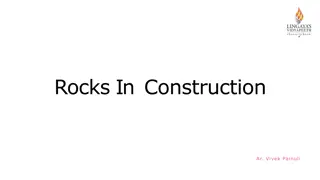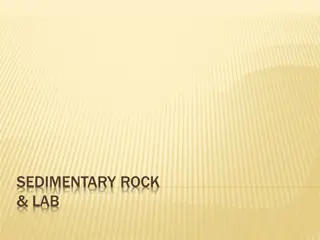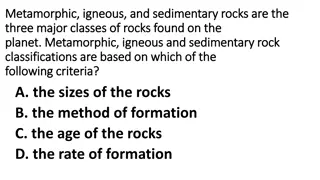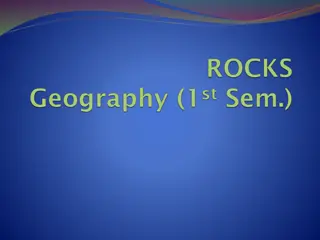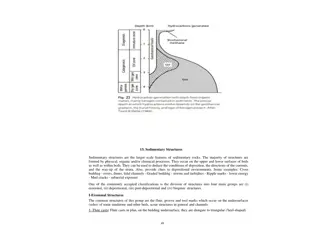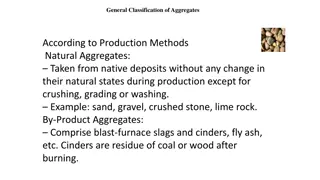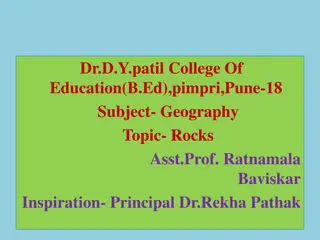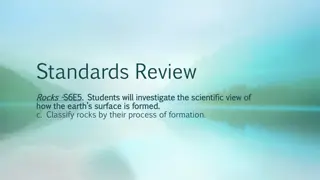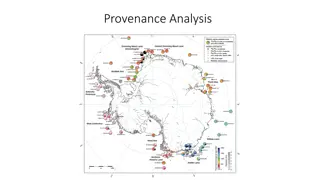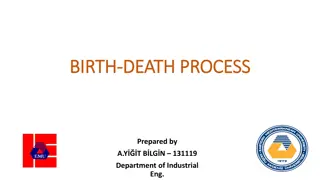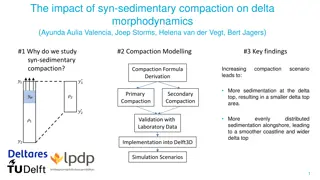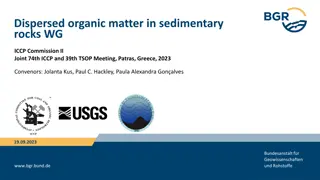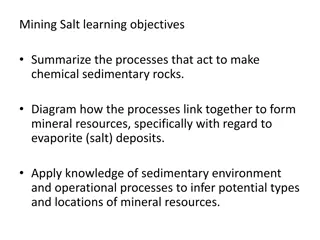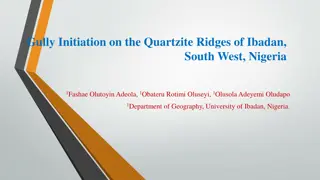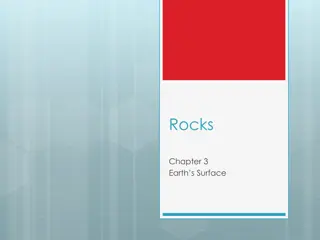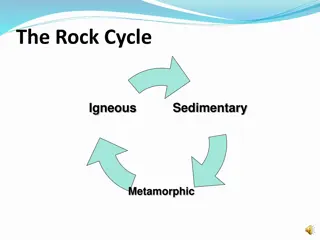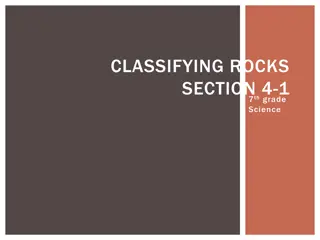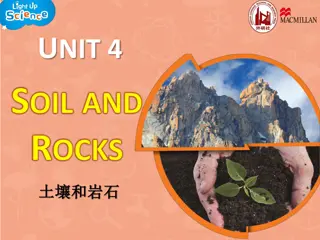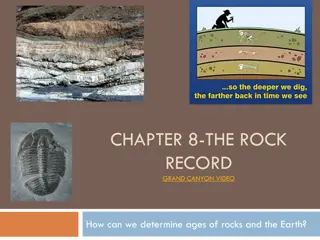Geology of Ogun State, Nigeria: Insights and Implications
The geology of Ogun State in southwestern Nigeria, particularly within the Dahomey or Benin Basin, holds significant value for understanding the region's origins and geological evolution. This includes insights on sedimentary basins, the Wilson Cycle, and the unique characteristics of the Dahomey or
3 views • 35 slides
Processes and Interactions
Processes in operating systems involve executing programs on CPUs, with each process having its own CPU. Processes run concurrently and can cooperate or compete for resources. Defining, creating, and managing processes is crucial for system efficiency and performance. Precedence relations, semaphore
1 views • 38 slides
A Life of a Process
This content delves into the creation and management of processes in operating systems, covering concepts such as forking processes, process states, address space management, copying processes, and key functions involved in process handling. It provides insights on constructing processes from scratc
0 views • 35 slides
Understanding Diagenesis and Lithification in Sedimentary Rocks
Diagenesis and lithification are crucial processes that transform loose sediment into solid rock through compaction and cementation. Diagenesis involves various chemical, physical, and biological changes while lithification involves the pressure-induced consolidation of sediment. Compaction removes
0 views • 15 slides
Understanding the Rock Cycle: Igneous, Sedimentary, and Metamorphic Rocks
This educational material covers the formation and characteristics of Igneous, Sedimentary, and Metamorphic rocks. It includes details on the processes involved, such as heat melting rocks into magma, sediment formation through erosion and deposition, and the differentiation between intrusive and ex
1 views • 16 slides
Understanding the Gondwana Super Group and Its Classification
The Gondwana Super Group, named after the Gond Kingdom, consists of sedimentary rocks deposited from the Carboniferous to Jurassic periods. These rocks provide insights into changing climatic conditions over millions of years. Classification of the Gondwana rocks is based on paleontological and lith
0 views • 23 slides
Understanding Sediment and Sedimentary Rock Textures
Discover the textures and structures of sediment and sedimentary rocks, including clastic and crystalline textures, primary and secondary textures, and the effects of compaction. Learn about sediment texture, differences in sedimentary rock texture, and the classification of grain sizes using the We
1 views • 20 slides
Exploring UK Mountains and Rock Formations: A Geographical Journey
Uncover the mysteries of UK mountains and rock formations through a fascinating exploration of mountain ranges, such as the Grampian Mountains and Pennines, and various rock types like Sedimentary, Igneous, and Metamorphic. Discover how the geological landscape is shaped by the type of rock present
1 views • 13 slides
Formation and Characteristics of Sedimentary and Metamorphic Rocks
Sedimentary rocks are formed through the aggregation and compaction of sediments, while metamorphic rocks result from changes in the form or composition of existing rocks. Sedimentary rocks contain layers of different sediments and are abundant on Earth's surface, while metamorphic rocks undergo met
0 views • 7 slides
Developing a Participatory Approach to Fisheries Management in UK Offshore MPAs
The 2-year project launched in April 2018 aims to address uncertainty around fishing impacts in offshore environments by engaging key stakeholders through Adaptive Management. The project focuses on developing a consistent approach for managing sedimentary habitats in light of scientific uncertainty
2 views • 15 slides
Field Sedimentology: Methods and Tools for Sedimentary Studies
Sedimentology involves interpreting sediments and rocks in terms of transport and deposition processes, distribution in space and time. Field studies require basic equipment like a notebook, hand lens, compass, clinometer, hammer, and GPS. Palaeocurrent indicators provide evidence of flow direction
0 views • 28 slides
Importance of Rocks in Construction and Building Materials
Rocks play a crucial role in construction as geological materials for foundations and building structures. They are classified into igneous, sedimentary, and metamorphic categories based on their composition and properties. Traditional stone masonry is being replaced by modern techniques like stone
1 views • 15 slides
Understanding Sedimentary Rocks and Their Formation
Explore the world of sedimentary rocks through detailed descriptions and images. Learn about the formation process involving sediment deposition, lithification, and the various types of sedimentary rocks such as conglomerate, sandstone, shale, and more. Discover how organic sedimentary rocks like co
0 views • 20 slides
Understanding Rocks: Types, Formation, and Properties
Rocks can be classified as metamorphic, igneous, or sedimentary based on their formation processes. Florida's phosphate deposits and pumice formation showcase the diversity of rocks. A scientist's rock cycle model helps predict changes, while pressure on sediments leads to new rock formation. Basalt
1 views • 22 slides
Understanding Different Types of Rocks and How They Form
Rocks are essential components of Earth's crust, consisting of various minerals held together by natural cement. They can be categorized into three groups: Igneous, Sedimentary, and Metamorphic rocks. Each group is formed differently, either through volcanic activity, sedimentation, or existing rock
3 views • 16 slides
Understanding Rocks and Minerals: Types and Formation
Rocks and minerals are natural substances with distinct characteristics. Rocks are solid aggregates of minerals or mineraloids, while minerals are naturally occurring chemical compounds. There are three main types of rocks: igneous, sedimentary, and metamorphic, each formed through different process
0 views • 16 slides
Sedimentary Structures: Types and Significance
Sedimentary structures are features found in sedimentary rocks that provide valuable information about the conditions of deposition, current directions, and depositional environments. They can be erosional, depositional, post-depositional, or biogenic in nature, with examples including flute casts,
0 views • 6 slides
Multibeam Data Analysis for Seabed Characterization at Deception Island, Antarctic
This work explores the morphological and sedimentary characterization of the seabed at Deception Island, Antarctic, through the analysis of multibeam bathymetric data and geological samples. The study identifies ravines, depressions, and volcanic structures as key features, revealing a seabed predom
0 views • 7 slides
Comprehensive Classification of Aggregates and Their Characteristics
Classification of aggregates based on production methods (natural, by-product, processed, colored), petrological characteristics (igneous, sedimentary), and particle size (fine aggregate, coarse aggregate). Examples and images are included for better understanding.
0 views • 5 slides
Understanding Rocks: Types, Formation, and Importance in Geology
Rocks are solid accumulations of minerals found in the Earth's lithosphere. They are classified into igneous, sedimentary, and metamorphic types based on their mineral composition. Rocks play a crucial role as geological materials for construction and historical buildings. Learn about the properties
0 views • 31 slides
Geology Test Review: Rocks and Minerals
This review covers the identification of rocks as igneous, sedimentary, or metamorphic, along with definitions and properties of minerals like cleavage, crystal structure, streak color, and more. It also discusses the classification of rocks as foliated or nonfoliated. Prepare for your geology test
2 views • 112 slides
Exploring Rocks: A 7th Grade Science Book on the Rock Cycle
Dive into the world of rocks with this comprehensive 7th-grade science book. Learn about the different types of rocks - igneous, metamorphic, and sedimentary. Explore how rocks are formed and categorized, and discover the processes that shape our Earth's rocky landscapes. Engage in hands-on activiti
0 views • 24 slides
Understanding Rock Formation and the Rock Cycle
Explore how the Earth's surface is formed through the classification of rocks based on their processes of formation. Learn about different rock types such as igneous, sedimentary, and metamorphic rocks, and understand concepts like the rock cycle and the effects of pressure on sedimentary rocks.
0 views • 13 slides
Understanding Sedimentary Rock Characteristics: Provenance and Weathering
Explore the significance of provenance analysis in interpreting the origin of sedimentary rocks based on lithological characteristics. Learn about mechanical and chemical weathering processes, compositional and textural maturity, mineral stability during weathering, and how rock particles indicate t
0 views • 12 slides
Understanding Sedimentology: An Overview of Sedimentary Processes and Rocks
Sedimentology is the study of modern sediments like sand, mud, and clay, along with the processes involved in their deposition. Sedimentologists use this knowledge to interpret Earth's geologic history through sedimentary rocks and structures. Sediment plays a crucial role in enriching soil with nut
0 views • 27 slides
Daily Batch Process for Demand Forecasting - Roadmap and Import Actions
In this data workflow, a roadmap is prepared for batch processes related to demand forecasting. It includes steps for uploading and importing data into Anaplan, SQL sources, EBS processes, and various file imports. The script names and processes are outlined with caution against renaming data hub pr
0 views • 14 slides
Understanding Programs and Processes in Operating Systems
Exploring the fundamental concepts of programs and processes in operating systems, this content delves into the definitions of programs and processes, the relationship between them, the components of a program, what is added by a process, and how processes are created. The role of DLLs, mapped files
0 views • 22 slides
Understanding Linux Processes and Controlling Them
This content provides insights into Linux processes, including parent-child relationships, process management commands like ps and top, background jobs, bringing processes to the foreground, and terminating processes. It also covers killing processes using kill and killall commands.
0 views • 7 slides
Phonetic Processes Exercises for Linguistics Students
Practice identifying phonetic processes such as stridency deletion, stopping, fronting, and more with exercises involving target words. Determine which processes apply to various words and mark the likely processes for specific targets. Enhance your understanding of substitution processes in linguis
0 views • 5 slides
Pure Birth Processes in Industrial Engineering
Birth-death processes, Yule-Furry models, and pure birth processes are discussed in the context of industrial engineering. The study of evolutionary processes, population dynamics, and radioactive transmutations are explored through mathematical models and examples. The concept of state transitions
0 views • 19 slides
The Impact of Syn-Sedimentary Compaction on Delta Morphodynamics
This study examines the influence of syn-sedimentary compaction on delta development, particularly focusing on how compaction affects delta morphology. It addresses the lack of field measurements by proposing simulation models as an alternative approach to understanding the link between compaction a
0 views • 12 slides
Understanding Microfacies Analysis in Sedimentary Geology
This chapter discusses field work studies, sampling strategies, and laboratory methods essential for microfacies analysis. It emphasizes the importance of precise field records, vertical and lateral variations in sampling, and studying microscopic features along with mineralogical and geochemical da
0 views • 22 slides
Dispersed Organic Matter in Sedimentary Rocks - Review Paper for Geological Application Studies in the 21st Century
The WG on Dispersed Organic Matter in Sedimentary Rocks is working on a review paper focusing on application studies of dispersed organic matter (DOM) within a geological context. The paper aims to provide an insightful overview titled "Applications of Dispersed Organic Matter Petrology in the 21st
0 views • 18 slides
Formation of Salt Deposits: Processes and Mineral Resources
Understanding the processes involved in the formation of chemical sedimentary rocks, particularly evaporite deposits like salt, is crucial for inferring potential mineral resources. This involves concepts such as evaporation, chemical weathering, crystallization, and lithification, which link togeth
0 views • 4 slides
Gully Erosion Studies in Ibadan, Nigeria: Quartzite Ridges Assessment
This study focuses on gully erosion initiation and development on the quartzite ridges of Ibadan, Nigeria. It explores the morphological characteristics of gullies, factors influencing gully formation, and their relationship with gully morphology. The research highlights the importance of understand
0 views • 20 slides
Understanding Rocks and the Rock Cycle
Explore the world of rocks through this educational content on Earth's surface, rock cycle, rock types (igneous, sedimentary, metamorphic), and the formation of igneous rocks from magma and lava. Learn how rocks are made of minerals, the continuous process of the rock cycle, and the classification o
0 views • 29 slides
Understanding the Rock Cycle Process
Exploring the rock cycle, which involves the formation, transformation, and breakdown of rocks into three main types: sedimentary, igneous, and metamorphic. Learn about how rocks change through processes like heat, pressure, erosion, and melting.
0 views • 9 slides
Understanding Rock Classification in 7th Grade Science
When studying rocks, scientists analyze their mineral composition, color, and texture. Rock-forming minerals play a significant role in Earth's geology, with granite and basalt being prime examples. The texture of rocks is determined by the size, shape, and pattern of grains present. Rocks form thro
0 views • 9 slides
Exploring Soil, Rocks, and Minerals
Explore the wonders of soil, rocks, and minerals through engaging activities like separating soil components, testing drainage, and understanding rock formation. Discover how rocks are made, including volcanic and sedimentary rocks. Enhance your knowledge and have fun learning about the Earth's mate
0 views • 8 slides
Understanding Rock Ages: A Geologic Perspective
Geologists determine the ages of rocks and the Earth using principles like Uniformitarianism, Relative Age, Law of Superposition, and Principle of Original Horizontality. By analyzing rock layers, sedimentary structures, and unconformities, they estimate Earth's age to be around 4.6 billion years ol
0 views • 15 slides

